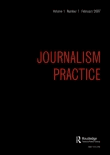
Journalism Practice
Scope & Guideline
Advancing the Future of Journalism and Communication
Introduction
Aims and Scopes
- Journalistic Role Performance:
The journal examines the various roles journalists play in society, including their responsibilities during crises, the impact of social media, and their adaptation to new technologies. - Crisis Journalism:
A significant focus is placed on how journalism responds to crises, such as the COVID-19 pandemic and political upheavals, analyzing the practices and challenges faced by journalists in these contexts. - Diversity and Inclusion in Journalism:
The journal explores issues related to diversity, equity, and representation within journalism, including the experiences of marginalized groups and how these factors influence news coverage. - Technological Integration:
Research on the integration of technology in journalism, including data journalism, automated news production, and the use of social media, is a prominent theme, reflecting the changing nature of news dissemination. - Ethics and Accountability:
The journal addresses ethical considerations in journalism, including issues of trust, misinformation, and the responsibilities of journalists to their audiences. - Audience Engagement and Participation:
Exploring how audiences interact with news, the journal looks at participatory journalism, audience analytics, and the impact of social media on audience engagement.
Trending and Emerging
- Impact of Artificial Intelligence (AI) on Journalism:
Recent studies focus on how AI is reshaping newsrooms, affecting journalistic workflows, and altering the relationship between journalists and their sources. - Mental Health and Well-being of Journalists:
Papers increasingly explore the mental health challenges faced by journalists, particularly in high-stress environments and during crises, highlighting the importance of support systems. - Solutions Journalism:
There is a growing interest in solutions journalism, which emphasizes reporting on responses to social issues, allowing for a more constructive approach to news coverage. - The Role of Social Media in News Reporting:
Emerging themes focus on how social media platforms influence news dissemination and the evolving relationship between journalists, audiences, and social media. - Diversity and Representation in Newsrooms:
The journal highlights the importance of diverse voices and perspectives in journalism, addressing the need for more inclusive practices and representation in news coverage. - Crisis Reporting and Ethical Considerations:
With the increasing prevalence of crises, the journal examines ethical dilemmas faced by journalists during such events, emphasizing the need for accountability and responsible reporting.
Declining or Waning
- Traditional Journalism Practices:
As the focus shifts towards digital and automated journalism, traditional practices such as print journalism and conventional reporting methods are becoming less emphasized in the journal's publications. - Overly Generalized Journalism Studies:
Research that lacks specificity or fails to address contemporary issues in journalism is less frequent, as the journal increasingly favors studies that provide in-depth analysis and practical implications. - Historical Analysis of Journalism:
There is a noticeable decline in papers focused solely on historical perspectives of journalism, as contemporary issues and innovations take precedence in the discourse.
Similar Journals
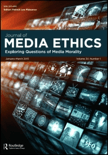
Journal of Media Ethics
Connecting Scholars and Practitioners in Media Ethics.Journal of Media Ethics, published by Routledge Journals, Taylor & Francis Ltd, is a pivotal platform for scholars and practitioners interested in the intersection of media, ethics, and communication. Operating since 2015, this esteemed journal has consistently contributed to the discourse on ethical frameworks in contemporary media practices, making significant strides in the fields of communication and philosophy. With an impressive Q2 category ranking in Communication and a Q1 category ranking in Philosophy as of 2023, the journal demonstrates its influence and relevance, achieving Scopus ranks that place it in the top 87th percentile for Philosophy and the 62nd percentile for Communication. Despite being a subscription-based journal, it caters to an interdisciplinary audience eager to explore the ethical dimensions of media in a rapidly evolving digital landscape. Researchers, professionals, and students alike will find valuable insights and innovative research within its pages, underscoring the importance of ethical considerations in framing media narratives.

Journalism and Media
Innovating Knowledge in the Evolving Media LandscapeJournalism and Media is a premier, peer-reviewed academic journal hosted by MDPI, dedicated to advancing knowledge in the fields of journalism, media studies, and communication. Established in 2020, this Open Access journal aims to facilitate the dissemination of high-quality research free of cost, promoting inclusivity and accessibility in academia. Additionally, it boasts a substantial reputation, reflected in its impressive Q1 rankings in both the Arts and Humanities as well as Linguistics and Language, and a Q2 category standing in Social Sciences (miscellaneous) for 2023. With Scopus rankings placing it within the top 15% of journals in its field, Journalism and Media not only contributes significantly to contemporary discourse but also provides an essential platform for interdisciplinary collaboration and innovation. Researchers, professionals, and students alike are encouraged to engage with the journal’s rich array of articles that explore the complexities of media dynamics, journalistic integrity, and the impact of technology on communication practices.

Pacific Journalism Review
Empowering Pacific Perspectives in Communication Studies.The Pacific Journalism Review, published by the Auckland University of Technology’s Creative Industries Research Institute, stands as a pivotal platform for scholarly discourse in the field of journalism and communication, particularly within the Pacific region. With an ISSN of 1023-9499 and an E-ISSN of 2324-2035, this journal has embraced Open Access since 2016, thereby enhancing accessibility and dissemination of research findings. Located in Auckland, New Zealand, it has been a critical outlet for innovative research and analysis from 2005, converging onto the contemporary landscapes of media practices through 2024. Featuring a 2023 Scopus ranking of #211 in the field of Communication, placing it in the 58th percentile, this journal is recognized for its significant contributions to the academic community, evident from its classification in the Q3 quartile. Aimed at researchers, professionals, and students alike, the Pacific Journalism Review not only enriches the discourse in communication studies but also shapes the future narratives of journalism in the Pacific and beyond.
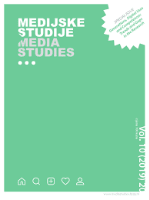
Medijske Studije-Media Studies
Empowering Voices in Media StudiesMedijske Studije-Media Studies, an esteemed journal published by SVEUCILISTE & ZAGREBU, FAK POLITICKIH ZNANOSTI, is a pivotal platform in the field of communication studies and media research. Established in Croatia, this Open Access journal since 2010 features a diverse array of research articles that explore the multifaceted relationships between media and society. With its ISSN 1847-9758 and E-ISSN 1848-5030, the journal serves an international audience and is committed to disseminating innovative insights that drive media scholarship forward. Currently ranked in the Q3 category in Communication and Q4 in Computer Science Applications for 2023, it reflects its growing influence, capturing vital trends and analyses that resonate in both academic and practical realms. The journal's Scopus rank sits at #337 out of 511 in Social Sciences_ Communication, placing it within the 34th percentile, thus establishing its relevance in the global discourse on communication. Researchers, professionals, and students are encouraged to engage with this resource as it continues to forge connections between media studies and contemporary societal issues.
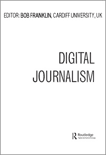
Digital Journalism
Unveiling Contemporary Challenges in the Digital News LandscapeDigital Journalism is an esteemed academic journal dedicated to advancing the interdisciplinary field of digital communication and journalism. Published by Routledge Journals, Taylor & Francis Ltd, this journal has established itself as a leading resource with a noteworthy Q1 rank in Communication for 2023, placing it among the top tier of journals in this dynamic field. With its ISSN 2167-0811 and E-ISSN 2167-082X, it serves as a pivotal platform for researchers, professionals, and students interested in exploring the intersection of technology and journalism, publishing insightful studies that address contemporary challenges and innovations. The journal has been continually evolving since its inception in 2013 and is set to extend its reach until 2024, consistently attracting high-quality scholarly contributions. With a distinguished rank of 11 out of 511 in Scopus's Social Sciences - Communication category, and boasting an impressive 97th percentile, Digital Journalism is an essential read for anyone keen on understanding the future of news in the digital era.
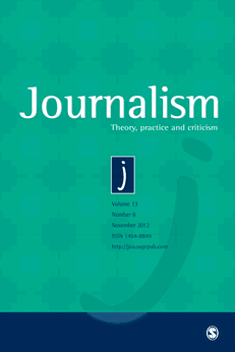
Journalism
Advancing the Discourse on Journalism's Role in a Changing WorldJournalism is a leading interdisciplinary journal published by SAGE Publications Inc, renowned for its rigorous academic standards and impactful research. With an ISSN of 1464-8849 and E-ISSN 1741-3001, the journal has established itself within the top quartile of both the Arts and Humanities and Communication fields, boasting an impressive rank of 22nd out of 552 in Arts and Humanities (miscellaneous) and 35th out of 511 in Social Sciences (Communication) as of 2023. This journal, based in the United Kingdom, is committed to fostering scholarly dialogue surrounding journalism’s evolving role in society, covering a wide range of topics including media ethics, digital communication, and the impact of state and global politics on public discourse. Notably, the journal does not offer open access, enhancing its exclusive appeal to academics and professionals. With a focused scope that extends from 2000 to 2024, Journalism contributes to the understanding of emerging trends and challenges, making it an invaluable resource for researchers, practitioners, and students alike seeking to engage deeply with contemporary issues in the field.
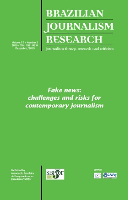
Brazilian Journalism Research
Navigating the Evolving Landscape of MediaBrazilian Journalism Research is a leading platform in the field of communication studies, focusing on the dynamic landscape of journalism in Brazil and beyond. Published by SBPJOR, this open-access journal has been committed to scholarly dissemination since 2005, facilitating a diverse array of research that informs both academic and professional practices. With an ISSN of 1808-4079 and an E-ISSN of 1981-9854, the journal explores critical issues within journalism, including media practices, policy analysis, and the social implications of news dissemination. Recognized in the Q3 quartile of Communication as per 2023, it ranks 324 out of 511 in the Scopus social sciences communication category, highlighting its growing reputation amidst an evolving field. The journal's commitment to quality research is further exemplified through its converged years from 2018 to 2024, which enables it to analyze contemporary trends and future directions. Researchers, professionals, and students alike are encouraged to access this journal to enrich their understanding and engagement with Brazilian journalism scholarship.

Theoretical and Practical Issues of Journalism
Unveiling Innovative Insights for Modern JournalismTheoretical and Practical Issues of Journalism is a prestigious journal published by Baikal State University, that explores a broad spectrum of topics within the field of journalism. With an ISSN of 2308-6203 and an E-ISSN of 2308-6211, this journal commits to advancing the discourse in both theoretical frameworks and applied methodologies that shape contemporary journalism practices. Although it operates under an open-access model, aiming to enhance accessibility for researchers, professionals, and students worldwide, the journal does not currently display an H-index, reflecting an exciting opportunity for early career researchers to contribute to building its impact. Situated in Irkutsk, Russia, the journal serves as a vital platform for the dissemination of innovative research and critical analysis, aimed at addressing the evolving challenges in journalism today. Its scope encompasses interdisciplinary studies, media ethics, digital journalism, and the socio-political dynamics impacting the news landscape, making it an invaluable resource for anyone vested in the field. As the media environment thrives amidst rapid technological changes, Theoretical and Practical Issues of Journalism remains essential for fostering dialogue and encouraging scholarly efforts that respond to these shifts.
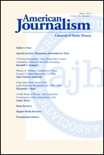
American Journalism
Navigating the Future of News and Media.American Journalism is a prominent peer-reviewed journal dedicated to advancing the field of communication, with a particular focus on the evolving landscapes of journalism practices and media studies. Published by Routledge Journals, Taylor & Francis Ltd, this journal serves as a critical platform for researchers, professionals, and students aiming to explore the multifaceted dimensions of journalism from 1983 to the present. While it currently holds an impact factor ranking within the Q4 category of communication disciplines, its commitment to publishing innovative research and fostering dialogue ensures it remains an integral resource for understanding contemporary media dynamics. With its address in the heart of the United Kingdom, the journal upholds a global perspective, engaging with diverse issues relevant to today's journalistic environment. Although it does not provide open access options, the journal offers access through various academic libraries and institutional subscriptions, making it a valuable asset for anyone invested in the future of journalism.

Revista de Comunicacion-Peru
Exploring the Frontiers of Communication Studies.Revista de Comunicación-Perú is a distinguished open-access journal published by Universidad de Piura, with a dedicated focus on communication studies. Since its inception in 2002, the journal has provided a vital platform for researchers, professionals, and students to disseminate knowledge and foster discourse in the field of communication. As of 2023, it proudly holds a Q1 classification in the Communication category and ranks impressively in Scopus, placing at #117 out of 1304 in Cultural Studies and #160 out of 511 in Communication, demonstrating its significant impact within the academic community. The journal’s scope encompasses diverse topics related to communication, cultural discourse, and media analysis, making it an essential resource for those seeking to explore contemporary issues in these areas. With a commitment to promoting scholarly exchange, Revista de Comunicación-Perú continues to play a pivotal role in shaping the communication landscape in Peru and beyond.